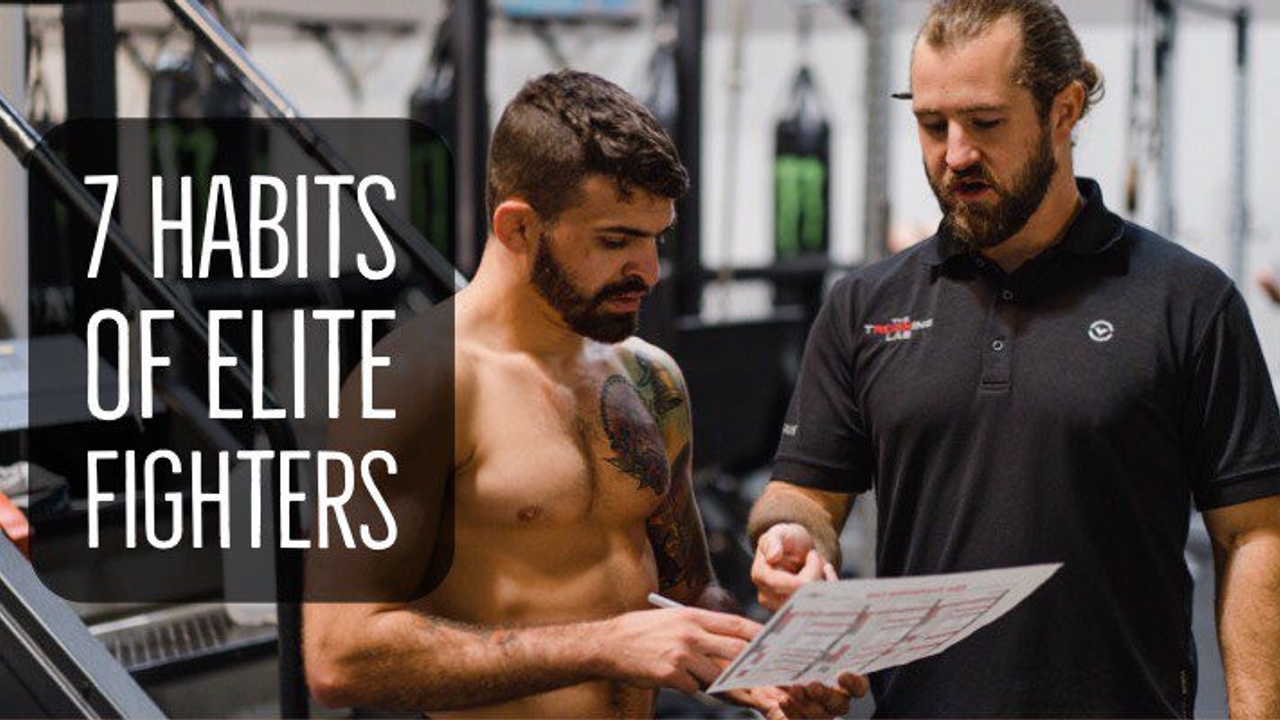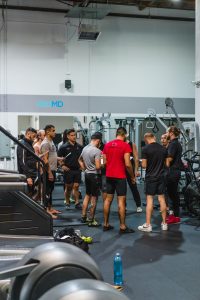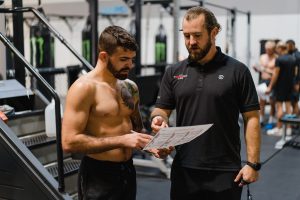
7 Habits of Elite Fighters
By Matt Bousson
“Everyone’s tough. If you weren’t tough you wouldn’t be here. Anyone can be tough, not everyone can be smart.”
Long time UFC Veteran and Coach Cub Swanson was speaking to a room of younger athletes, and probably told them one of the most valuable things they will hear throughout their careers – be smart. In a relatively new sport, I feel like this is where the biggest changes have occurred and are occurring; having a smart, scientific plan behind training in MMA. Along with effective programming here is a list of 7 habits that will not only take your game to the next level but keep you there:

7 Habits for Elite Fighters
1. Consistency
 “Without consistency there are no champions.” A quote I picked up along the way. Basically the foundation of any successful sporting career. You’d be hard pressed to find a champion in any sport that isn’t consistent.
“Without consistency there are no champions.” A quote I picked up along the way. Basically the foundation of any successful sporting career. You’d be hard pressed to find a champion in any sport that isn’t consistent.
Tips:
Consistent training habits, especially out of fight camps so the fight camp can focus on the fight, not getting back into shape. Consistent dietary habits to improve body composition year round, plus make the weight cut a much easier and manageable ordeal. Consistency in your approach to being a professional (i.e. social media, interaction with fans, talking to sponsors, marketability, media etc.).
2. Attention to Detail
Paying attention to all things, no matter how seemingly small. Small details add up. Attention to Detail means you are aware of everything you do and why you do it. It requires a huge amount of effort and diligence. It means paying attention to coaches, instructions, advice, techniques, criticism, etc etc. In action, it requires purpose & intent, “going through the motions” doesn’t cut it.
Tips:
Use every warm up as an opportunity to “master a movement.” Remember details - write them down, keep a journal, use a memo or voice app, review sessions.
3. Self-Discipline
At the end of the day, no one can do it for you. – One of the truest truths there is. You can have the best plan, coaches, and team in the world, but if there isn’t a highly self-motivated, dedicated and committed mindset behind action on a daily basis, then potential may never be reached. “Discipline kicks in when motivation runs out.”
Tips:
Habits sound hard to achieve but they’re actually fairly easy to master when practiced daily.
Start with small baby steps and practice easy tasks then progress & challenge yourself. Create a 10 -15 minute morning routine (include some kind of movement, reading, game and planning) and mark down on a calendar every day it’s completed until you don’t need to count the days any more (re-assess everyday 18-21 days).
4. Reverse Engineer
 Work backwards. Figure what you want and when you want it by then plan backwards. When you plan backwards and reverse engineer, you put yourself in a proactive mindset, which is the key to preparation. “Give me six hours to cut down a tree and I’ll spend the first four sharpening the axe.” (*having a plan is not against being adaptable! See Habit #6).
Work backwards. Figure what you want and when you want it by then plan backwards. When you plan backwards and reverse engineer, you put yourself in a proactive mindset, which is the key to preparation. “Give me six hours to cut down a tree and I’ll spend the first four sharpening the axe.” (*having a plan is not against being adaptable! See Habit #6).
Tips:
Start big, finish small. I.e. 12 months from now > 6 months > 3 months > 2 weeks > tomorrow. What you (usually) end up with is a step by step blueprint of what needs to be achieved and when it needs to be achieved by. Then any additional planning/programming will fill the gaps to ensure you get from Point A (tomorrow) to Point B (12 months from now) and reach your goals along the way.
5. Growth Mindset
This requires daily, even hourly reminders. A growth mindset requires a constant effort of removing emotion for the sake of objectively assessing performances and habits. Assess & reassess. Remove emotions from the learning process to effectively listen to, accept and take on constructive criticism without feeling attacked or insulted. “Being coachable” is vital.
Tips:
Kill your ego. Learn to take feedback and constructive criticism from all walks of life – not everyone has to be an “expert” to give you advice and/or support.
6. Adaptability
“Adapt. Improvise. Overcome.” Plans are great, and a huge part of the process, but the ability to adapt is necessary for survival. The ability to adapt your skillset to new opponents is now the norm in MMA.
Tips:
Learn. New. Skills. “Learning new skills, helps learn new skills.”
Regularly expose yourself to new stressors and uncomfortable environments. A great mantra is “get comfortable being uncomfortable.” I use this metaphor for developing both mental and physical attributes (a similar term I have heard in the profession is “mental agility”) things like decision making, reaction time, hand-eye coordination, footwork, etc. Developing these skills doesn’t always have to be hard and intense, try a new hobby, think outside the box, try something completely outside of fighting and martial arts, challenge all different kinds of coordination. Literally, conquer your fears (i.e. sky diving).
7. Actively Seek New Challenges
This may be the most vital. Seek challenges, always! Actively seeking new challenges helps reinforce qualities such as resiliency, patience, mental fortitude, and humility. Not only being competitive against OTHERS but being competitive with yourself.
Tips:
Find challenges daily. There’s always something we can improve. Get in the habit of finding new challenges as often as possible, it’s not only humbling but teaches us a lot about how we can deal with adversity and problem solve. Wake up earlier, stay behind after practice, spend more time on soft tissue work, perform extra reps, brain games, etc.
I’ve spent the better part of the last decade being obsessed with winning cultures and learning from the coaches and athletes that create those environments. To me being great means winning more than once, it’s something that’s repeated, and repeating sporting success divides the pros from the Hall of Fame pros. From my very first experience in an “expect to win program” I have listened and learned from some of the best athletes and coaches of our generation, these 7 habits are the ones that separate the competitors from the Champions. Which one will you be?
 Matthew Bousson (aka Coach Boss) has spent time with some of the world’s most elite athletes in a variety of different sports; including College Football, NFL, UFC and Rugby (both League and Union). Matthew extensive academic and research qualifications combined with a decade of coaching experience in the fields of Strength & Conditioning, Injury Prevention & Rehabilitation, Exercise Biomechanics and Sports Psychology. Matthew first got involved in Mixed Martial Arts in 2005 and is now working alongside Sam “Coach Cal” Calavitta at The Treigning Lab in Anaheim, Ca.
Matthew Bousson (aka Coach Boss) has spent time with some of the world’s most elite athletes in a variety of different sports; including College Football, NFL, UFC and Rugby (both League and Union). Matthew extensive academic and research qualifications combined with a decade of coaching experience in the fields of Strength & Conditioning, Injury Prevention & Rehabilitation, Exercise Biomechanics and Sports Psychology. Matthew first got involved in Mixed Martial Arts in 2005 and is now working alongside Sam “Coach Cal” Calavitta at The Treigning Lab in Anaheim, Ca.




